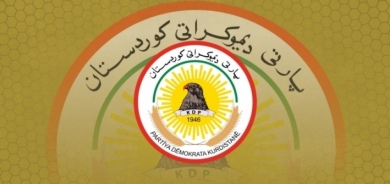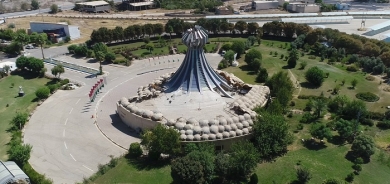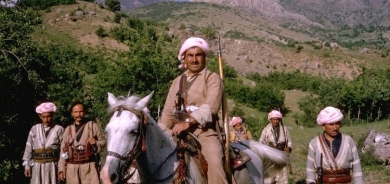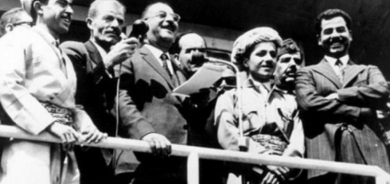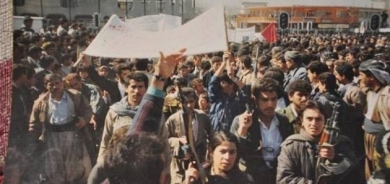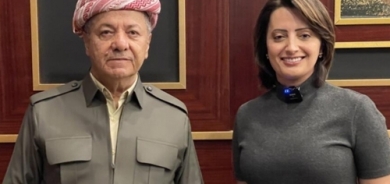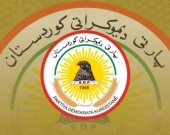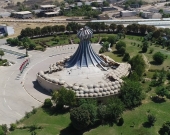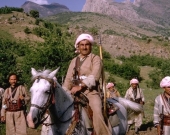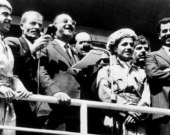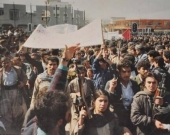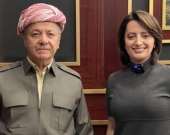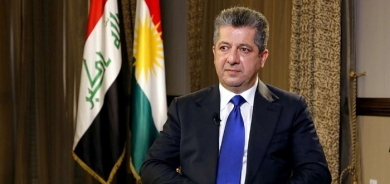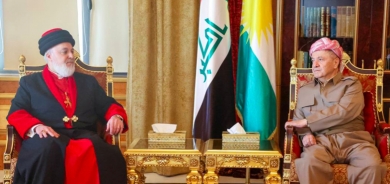A nation who faced genocide by chemical weapons cannot survive without an independent state
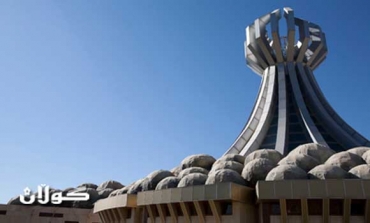
1. Admission. The guilty party has to admit that a crime was committed.
2. The olive branch. The transgressing nation has to be willing to reach out to the nation victimized.
3. Reception. The victimized nation has to be willing to communicate with the offending
nation.
4. Political Framework. There has to be common ground through which the needs and aspirations of both nations could be expressed.
5. Truth and Reconciliation. The victim nation has to have the means by which to forgive while the offending nation has to have a mechanism to confess. To answer your question, it's possible, but I don't think it's likely.
Theoretically; the Professor Marrar arranged coexistence mechanisms after genocide, he believe that it is possible, but he does not think that it will happen. During the interview, he added: “The Kurdish people have indeed been victims of genocide at the hands of many nations. I think that the Kurds, like Jews and Armenians, share an experience of genocide the needs international recognition. However, unlike Jews and Armenians, the Kurds have only recently become more politically astute. Both groups have been able to agitate for political recognition of their plight; however, because of a variety of factors, the Kurds have only recently enjoyed a level of political freedom that may allow them more traction for influence. This is something that has to be coupled with Kurdish expats acting on behalf of the Kurdish nation in key Western European countries and the United States. In much the same way that American Jews and French Armenians enjoy a good deal of influence over foreign policy matters, the Kurdish communities need to unify their efforts and secure recognition of issues important to the Kurdish nation. The Kurds, like the Palestinians, suffer from an asymmetric relationship with their neighbors. So long as that relationship continues, we will not have a resolution of separation, but instead something that more resembles the Bantustans of Apartheid South Africa.”
In the same respect and regarding to the Coexistence question, we contacted the Professor Hannibal Travis, a Professor of Law at Florida University, and he replied to our questions in an exclusive interview to Gulan Magazine as the following: “Peaceful co-existence after genocide requires measures to promote the existence of the victim group and to end the impunity of the perpetrators. In the European context, after World War II the international community began a systematic process of issuing financial and property-related reparations to the victims of the Holocaust, including not only Jews but Roma and Sinti people, Slavs, and the residents of occupied Western European countries. There were also large-scale trials of members and former members of the Nazi party, including criminal organizations such as political parties, at the international and national levels, and reaching thousand of German and pro-Nazi suspects from non-German countries. In addition, proceedings were opened concerning the persons who armed the Nazi war machine and exploited unpaid labor from the victims of Nazi terror. Finally, an enormous program to build up the defenses of the victims of Germany, including in Israel, Greece, Yugoslavia, Poland, Czechoslovakia, France, Britain, the Netherlands, Belgium, Norway, etc., including the distribution of the most advanced weapons technology to some of these countries. So the international community knows how to save threatened peoples and terminate the threat posed to them when it truly desires to do so. It has been the will that has been lacking in the cases of Iraq and Turkey.”
Regarding to the silence of the International community back then towards the Kurdish Genocide, the professor Hannibal thinks that; although the international community hadn't used the term “Genocide” but they haven't been silent, he said “The international community has not necessarily been silent about the Kurdish and Assyrian genocide in northern Iraq during the 1980s and early 1990s. In 1991, the U.N. Security Council, without using the word “genocide” condemned "the repression of the Iraqi civilian population in many parts of Iraq, including most recently in Kurdish populated areas, which led to a massive flow of refugees towards and across international frontiers and to cross-border incursions, which threaten international peace and security in the region". In 1992, the U.N. Commission on Human Rights, Report on the Situation of Human Rights in Iraq prepared by the Special Rapporteur for Iraq, reported on “mass murder and execution of Kurds, the destruction of Kurdish towns and villages, . . . and the use of excessive force, including chemical weapons, against the Kurds in times of conflict. . . .” U.N. Doc. No.E/CN.4/1992/31. The same report indicated that Iraq had "destroyed a great number of villages" of the Assyrians, killing many of the inhabitants and forcing others to flee during "massive internal deportations to move [Assyrians] away from the northern border region," using "massacres" and destruction of many Assyrian churches and monasteries (some of them of more than a thousand years old). Ibid. The report quoted the testimony of Assyrian bishop Zia Bobo Doubatou that chemical weapons had been used on Assyrians living in Berwarí, Afra and Ald-Sheikhan, that thousands of people had been killed or injured, and 150,000 people had fled to Turkey or Iran, and even after the end of the war with Iran, the Iraqi army had evacuated an strip of 50 km along the border and destroyed the villages. The report further described "the deportation of inhabitants of the regions of Berwari Balla, Nahla ('Oqra), Zakho, Dohuk and Neeroy Reekan between 1969 and 1987." In 1992, the U.N. Economic and Social Council circulated a statement directed to the U.N. Secretary-General, which stated that "infamous ethnic cleansing and relocation campaigns ... have been conducted under the direction of the Presidents of the former Yugoslavia and of Iraq, respectively. We are referring to the inhabitants of Bosnia and Herzegovina and about Iraq's so-called "un-Iraqi" Assyrians, Kurds, Turkomans and Shiites." E/CN.4/Sub.2/1992/NGO/27. Also in 1992, the U.N. Committee on the Elimination of Racial Discrimination asked Iraq to explain why "massive bombardments of the civilian population" had been carried out, and why the "flight of hundreds of thousands of Kurds, Shiites and other persons and on the attempt to repatriate them by force" had commenced, and whether "other minorities (Shiite, Assyrian or Turkoman) [were] represented in the National Assembly". In 1993, Middle East Watch published excerpts from documents indicating that the northern bureau of the Ba’ath Party, the General Security Directorate, Foreign Intelligence Agency, and Military Intelligenc ordered the Iraqi armed forces to “kill any human being or animal present within [prohibited] areas [of northern Iraq].” Also in 1993, Pax Christi, a non-governmental organization in consultative status with the United Nations, noted that "gross and persistent violations of human rights have been allowed to continue while the United Nations has remained conspicuously silent," and that the "deplorable situation of indigenous peoples in many countries," including "Assyrians in Iraq" "hardly get a mention." E/CN.4/Sub.2/1993/NGO/3. In 2007, the Iraqi High Tribunal, supported by American advisers, concluded that during the Anfal campaign, the death toll “reached tens of thousands of Kurdish victims between martyrs killed by raids (whether conventional or chemical weapons), or miss[ing] individuals buried in mass graves, found and anonymous, many observers have called the creation of Iraq as a large state a mistake that led to untold suffering. A similar mistake was made in other countries like the Congo, Nigeria, Sudan, and Yugoslavia. Creating autonomous or independent governments in the Nineveh Plains for Assyrians, the area around Shekhan and Lalish for the Yezidis, and the area from Akre and Amedi to Sulaymaniyah for the Kurds would be fair based on population size and historic ties to the region, analogous to the partition of Yugoslavia into Slovenia, Croatia, Bosnia, the Bosnian Serb Republic, Macedonia, Serbia, North Kosovo, and South Kosovo since about 1999.”
Genocide as the biggest crime against Humanity
Genocide is the biggest crime against humanity ever, the reason for this refers back to countries created by western colonial powers. Therefore; correcting this mistake is up to the western countries. Regarding to the savageness of Genocide, we contacted the Professor Liaquat Ali Khan, a professor of Law at Washburn University, and he responded to our questions in an exclusive interview to Gulan Magazine as the following: “Genocide is the greatest crime under international law for which no justification or defense is available. When an ethnic, racial, national, or religious population (group) is intentionally killed, the crime of genocide occurs. It is not required that the entire group be destroyed for the crime of genocide to occur. Even partial destruction of the group is genocide. In addition to physical destruction, even mental genocide falls with the definition of the crime. When social, economic, and political forces are engineered to make the life of a group highly distressful, the crime is perpetrated. The weapons of mass destruction are the curse of humanity. They are not hypothetical threats. They pose real danger to vulnerable minorities trapped in the nation-state. The chemical attacks on the Kurds demonstrate that these weapons are the tools of genocide against racial, ethnic, national, and religious minorities living under the oppressive control of majorities. The international community has a special obligation to assure that vulnerable groups such as the Kurds are protected from chemical and biological weapons of mass destruction. The Kurds of the region constitute a national and ethnic population that has been divided and distributed among several nation-states. The Kurdish population has been subjected to various degrees of physical and mental distress over the decades. The scars are deep and the brutality against the Kurds is historically documented. Deep distrust has been established between the Kurds and the controlling nation-states that deny them fundamental human dignity and life-sustaining freedoms. The Kurds suffered tragic destruction under the oppressive regime of Saddam Hussein. The chemical weapons brutalized Kurdish men, women, and children in Halabja. This ruthless treatment of a subjugated population is a testimonial that the irrational nation-state manufactured by the colonial powers has been a failure. The Kurds live under a constant and imminent fear of massacres and humiliation. Their demands for meaningful autonomy arise from the natural instincts of self-preservation. It is not that the Kurds do not love their neighbors. It is that the neighbors have mistreated the Kurds on a regular basis. The international community is under a moral obligation to recognize the historical massacres of the Kurdish population. The purpose of this recognition is to deter future governments from committing atrocities against the Kurdish people. The United Nations General Assembly must consider and pass a forceful resolution in favor of the autonomy of the Kurds and recognize them as a vulnerable population. In my book A Theory of Universal Democracy (2006) I argue that distinct populations like the Kurds must have their own Free State- a concept that should not be confused with the nation-state. Free State is the opposite of the modern nation-state that has proved to be an irrational and oppressive structure that leads to domination, suppression, and even destruction of distinct minorities placed under the control of dominant populations. The Kurds have a right to establish Free State in which their language, their culture, their history, and their future are fully protected and expressed.”
Translated by: Sheban Ferhad

